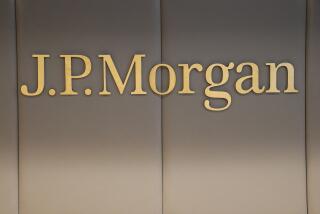Making Fannie Mae pay
- Share via
IT WAS WAY BACK IN 2004 when mortgage giant Fannie Mae came under fire for using risky investments and accounting tricks to meet its earnings-per-share targets. On Tuesday, the company finally announced that it would pay $400 million in fines and accept stiff restrictions on its operations in a long-awaited settlement with the federal government.
The settlement, along with the release of a scathing report by the Office of Federal Housing Enterprise Oversight, is welcome not just because it is a victory against shoddy corporate oversight. Bringing Fannie Mae to justice is important because of the company’s unique ties to Washington.
Like its smaller sibling Freddie Mac, Fannie Mae started life as a government entity, intended to keep mortgage markets liquid by buying loans from banks and reselling the debt to investors. Although it was turned over to private investors in 1968, the company remained what is called a government-sponsored enterprise. It enjoyed tax breaks, loose capital restrictions and low borrowing costs that were unavailable to other publicly traded companies. It also received preferential treatment from investors, who assumed that its ties to the federal government meant it could never go belly-up, and it faced less onerous regulation than other financial institutions.
The settlement and the report are a good start -- but only that -- to bringing Fannie Mae in line. The company, which has not filed an earnings statement since 2004, must get its finances in order. It already has invested millions to speed the process along, but it may still need months, if not years, to resolve its accounting discrepancies, estimated at $11 billion. Normal operations (not to mention recovery of the company’s stock, down more than 30% since 2004) depend on clearing this formidable hurdle.
Fannie Mae’s board should consider the next best thing to retroactively firing former Chief Executive Franklin Raines and former Chief Financial Officer Timothy Howard, who were allowed to take early retirement in 2004. It should force Raines and Howard -- and any others who profited through the accounting tricks -- to reimburse the company for the compensation they received by falsely achieving earnings targets. According to the report, $52 million of Raines’ $90 million in compensation from 1998 to 2003 was linked to “achieving” earnings-per-share goals.
The Securities and Exchange Commission and the Justice Department must continue their investigations, which will target individual executives. And, after years of dancing around the subject, Congress should follow the Bush administration’s lead and make it clear that, despite the widespread belief on Wall Street, these publicly traded companies won’t be bailed out by taxpayers should their riskier investments and hedging strategies backfire.
More to Read
Inside the business of entertainment
The Wide Shot brings you news, analysis and insights on everything from streaming wars to production — and what it all means for the future.
You may occasionally receive promotional content from the Los Angeles Times.










